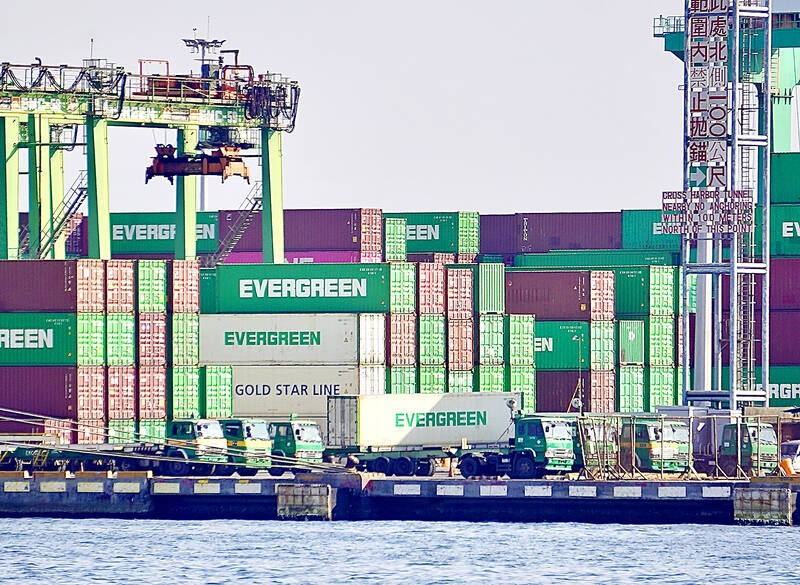The government’s business climate monitor last month flashed “yellow-red” light for the first time in two years, as strong industrial production, increasing imports of machinery equipment, robust domestic commercial activities and stock investments boosted the momentum of local businesses, the National Development Council said yesterday.
Prior to last month, the business climate monitor had maintained a “green” signal for three consecutive months.
The council measures the nation’s economic situation using a five-color system, with “blue” signaling a recession, “green” suggesting steady growth and “red” indicating a boom. “Yellow-red” reflects a slight boom, while “yellow-blue” shows sluggishness.

Photo: CNA
The total score of the monitor’s composite index rose four points from the previous month to 35, indicating steady growth for six months in a row, the council said in a report.
Meanwhile, the index of leading indicators, which gauges the economy’s direction in the next six months, moved up by 0.5 percent month-on-month to 102.09, rising for the seventh consecutive month, it said.
The index of coincident indicators, which tracks the current pace of economic activity, climbed 0.93 percent to 102.82, increasing for the 13th consecutive month, the council said.
“Benefiting from the growing demand for artificial intelligence and other tech applications, indicators such as industrial production, machinery and electrical equipment imports have turned to flashing red. Coupled with continued advancement in the leading and coincident indicators, the domestic economy is steadily recovering,” the council said.
Of the composite index’s nine components, the subindices on imports of capital equipment and sales of retail, wholesale and food and beverage services increased by two points each and changed from “green” the previous month to “red,” the report said.
The subindex on industrial production rose by one point, going from “yellow-red” a month earlier to “red,” while the subindex on manufacturing sales increased by one point, changing from “green” to “yellow-red, it said.
However, customs-cleared exports decreased by two points and flashed “green,” compared with “red” a month prior, the report said.
There were no changes in the signals of the other four subindices, including money supply, the TAIEX, non-agricultural employment and sentiment of the manufacturing sector, the report said.
Looking ahead, the council expects exports to continue showing steady growth, on the recovery of global trade and growing opportunities linked to emerging applications related to artificial intelligence.
It also said it expects domestic investment to continue gathering steam thanks to demand for advanced technologies, digital transformation and net zero carbon emissions, in addition to government projects for public works.
Meanwhile, private consumption is expected to retain strong momentum on the back of stable employment, higher minimum wages, a vibrant stock market and more government subsidies for housing and education, it said.
“However, uncertainties such as potential interest rate cuts in major economies, continued geopolitical risks and the intensifying rivalry between the US and China still exist, and their future developments deserve close observation,” the council said.

MULTIFACETED: A task force has analyzed possible scenarios and created responses to assist domestic industries in dealing with US tariffs, the economics minister said The Executive Yuan is tomorrow to announce countermeasures to US President Donald Trump’s planned reciprocal tariffs, although the details of the plan would not be made public until Monday next week, Minister of Economic Affairs J.W. Kuo (郭智輝) said yesterday. The Cabinet established an economic and trade task force in November last year to deal with US trade and tariff related issues, Kuo told reporters outside the legislature in Taipei. The task force has been analyzing and evaluating all kinds of scenarios to identify suitable responses and determine how best to assist domestic industries in managing the effects of Trump’s tariffs, he

TIGHT-LIPPED: UMC said it had no merger plans at the moment, after Nikkei Asia reported that the firm and GlobalFoundries were considering restarting merger talks United Microelectronics Corp (UMC, 聯電), the world’s No. 4 contract chipmaker, yesterday launched a new US$5 billion 12-inch chip factory in Singapore as part of its latest effort to diversify its manufacturing footprint amid growing geopolitical risks. The new factory, adjacent to UMC’s existing Singapore fab in the Pasir Res Wafer Fab Park, is scheduled to enter volume production next year, utilizing mature 22-nanometer and 28-nanometer process technologies, UMC said in a statement. The company plans to invest US$5 billion during the first phase of the new fab, which would have an installed capacity of 30,000 12-inch wafers per month, it said. The

Taiwan’s official purchasing managers’ index (PMI) last month rose 0.2 percentage points to 54.2, in a second consecutive month of expansion, thanks to front-loading demand intended to avoid potential US tariff hikes, the Chung-Hua Institution for Economic Research (CIER, 中華經濟研究院) said yesterday. While short-term demand appeared robust, uncertainties rose due to US President Donald Trump’s unpredictable trade policy, CIER president Lien Hsien-ming (連賢明) told a news conference in Taipei. Taiwan’s economy this year would be characterized by high-level fluctuations and the volatility would be wilder than most expect, Lien said Demand for electronics, particularly semiconductors, continues to benefit from US technology giants’ effort

‘SWASTICAR’: Tesla CEO Elon Musk’s close association with Donald Trump has prompted opponents to brand him a ‘Nazi’ and resulted in a dramatic drop in sales Demonstrators descended on Tesla Inc dealerships across the US, and in Europe and Canada on Saturday to protest company chief Elon Musk, who has amassed extraordinary power as a top adviser to US President Donald Trump. Waving signs with messages such as “Musk is stealing our money” and “Reclaim our country,” the protests largely took place peacefully following fiery episodes of vandalism on Tesla vehicles, dealerships and other facilities in recent weeks that US officials have denounced as terrorism. Hundreds rallied on Saturday outside the Tesla dealership in Manhattan. Some blasted Musk, the world’s richest man, while others demanded the shuttering of his